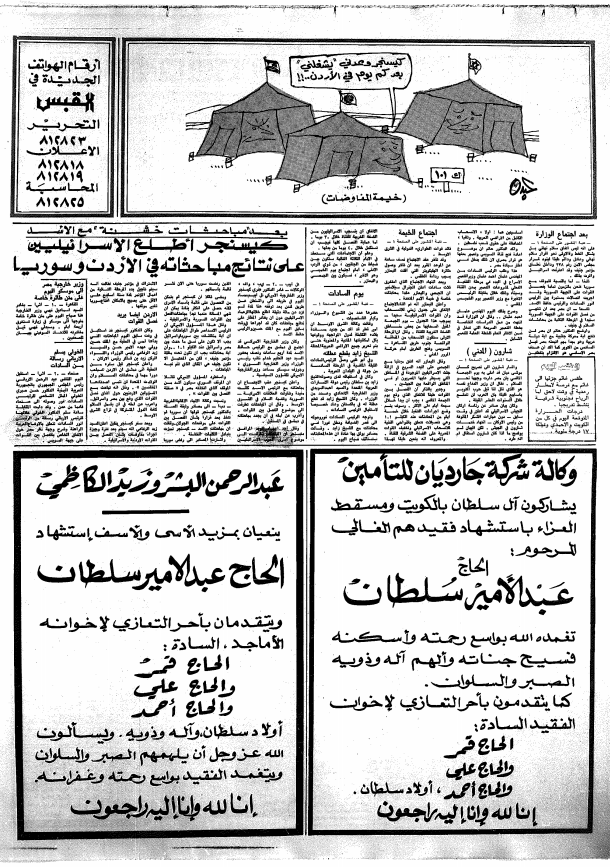In its issue dated January 21, 1974, Al-Qabas newspaper published a political news article on its last page regarding the outcome of talks between the United States Secretary of State and Syrian President Hafez al-Assad in Syria. Their discussions focused on the issue of separating forces and Israeli prisoners of war, whose names Syria had not yet released. Throughout the talks, President al-Assad insisted that any discussions between Syria and Israel should not follow the same course as what occurred between Egypt and Israel at Kilometer 101. He emphasized that any negotiations should take place under the framework of the Geneva Conference, although it’s possible that Geneva might not be the actual location for the talks. After the discussions, Henry Kissinger left for Tel Aviv, where he spent a brief time and informed Israeli leaders about the results of the Syrian-American talks, before returning to Washington.
The following is the text of the news article:
Dr. Henry Kissinger, the U.S. Secretary of State, left Tel Aviv in the evening on his way to Washington via London after a stop here of no more than one hundred minutes. During this time, he briefed Israeli leaders without leaving the airport on the results of talks he had earlier in the day with King Hussein and President Hafez al-Assad.
The U.S. Secretary of State had met in Damascus with President al-Assad for four and a half hours, in the presence of Mr. Abdul Halim Khaddam, Deputy Prime Minister and Syrian Minister of Foreign Affairs, and Joseph Sisco, Assistant U.S. Secretary of State for Political Affairs.
Kissinger announced after the meeting that his discussions with President al-Assad were productive and covered U.S.-Syrian relations and the issue of peace in the Middle East. He stated that the talks also addressed the matter of separating forces. He expressed his hope to renew his discussions in Damascus in the future.
One member of the delegation accompanying Kissinger stated that the talks also covered the issue of Israeli prisoners of war, whose names Syria had not yet disclosed. This official continued that Kissinger was unable to obtain a list of prisoner names, but he gained constructive ideas that could resolve the matter when the talks between Syrian and Israeli forces commence.
This American official also mentioned that President al-Assad persisted throughout the talks in asserting that any discussions between Syria and Israel should not follow the same course as what occurred between Egypt and Israel at Kilometer 101. He stressed that any negotiations should take place under the framework of the Geneva Conference, although it’s possible that Geneva might not be the actual location for the talks.
The American official went on to say that Syria’s stance would be more stringent than Egypt’s stance in the “separation of forces” deal. The West German news agency (DPA) attributed to sources closely related to Dr. Kissinger stating that Syria had not yet made a decision regarding the separation of forces on the Golan Heights, and it noted that the al-Assad-Kissinger talks were marked by harsh exchanges.
Sources indicated that Syria refused to participate in the Geneva Conference, stating that the next phase of the conference’s proceedings would be postponed for at least six weeks to potentially persuade Syria to change its position.
Jordan also seeks the separation of forces.
Earlier on the same day, Dr. Kissinger continued the talks he had started yesterday in Aqaba with King Hussein and Crown Prince Hassan, as well as Mr. Zaid Rifai, the Prime Minister, and Brigadier General Zaid bin Shaker, Chief of Staff.
Before his departure from Aqaba to Damascus, Kissinger announced that Jordan “will play an important role in peace talks and that the United States will not forget its loyal friends.” He mentioned that he discussed with Jordanian officials the separation of forces agreement signed between Egypt and Israel. He expressed his hope that peace would include all the countries involved in the Middle East conflict.
Shortly after Kissinger’s departure, Mr. Zaid Rifai announced that negotiations concerning the separation of Jordanian and Israeli forces would take place shortly.


